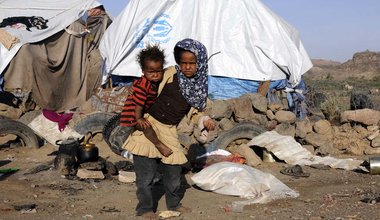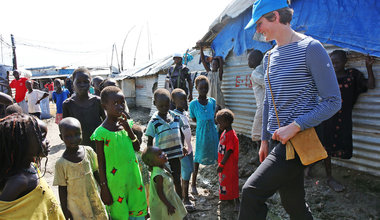UN human rights report urges end to ‘unimaginable abuse’ of migrants in Libya
 A joint report launched today by the United Nations Support Mission in Libya (UNSMIL) and the Office of the UN High Commissioner for Human Rights (OHCHR) citied “unimaginable” human rights violations and abuses of migrants in Libya as a result of the breakdown in the crisis-riven country’s justice system.
A joint report launched today by the United Nations Support Mission in Libya (UNSMIL) and the Office of the UN High Commissioner for Human Rights (OHCHR) citied “unimaginable” human rights violations and abuses of migrants in Libya as a result of the breakdown in the crisis-riven country’s justice system.
“People smuggled or trafficked into Libya face torture, forced labour and sexual exploitation along the route, and many while held in arbitrary detention,” Martin Kobler, the Secretary General’s Special Representative for Libya and Head of UNSMIL in a news release.
The report, entitled Detained and Dehumanised: Report on Human Rights Abuses against Migrants in Libya also stated that migrants were held in detention centres mostly run by the Department for Combatting Illegal Migration (DCIM), and had no access to lawyers or judicial authorities, no formal registration, and no legal process.
In addition, some migrants were held in “connection houses,” on farms, in warehouses and inside apartments. They were forced to work and earn money for their onward transport. “We are called animals and are treated as animals,” a 16-year-old boy from Eritrea had told UNSMIL.
The report also described armed men, allegedly from the Libyan Coast Guard, abusing migrants by bringing them to shore, beating, robbing, and taking them to detention centres.
“The list of violations and abuses faced by migrants in Libya is as long as it is horrific. This is, quite simply, a human rights crisis affecting tens of thousands of people,” said Zeid Ra’ad Al Hussein, the UN High Commissioner for Human Rights.
The report also urged Libyan officials to immediately release the most vulnerable migrants, with a view to urgently ending all arbitrary detentions; reduce the number of detention centres; ensure women were held separately from men; improve conditions of detention and protect detainees from torture and all other forms of abuse; and, in the medium-term, decriminalize irregular migration and adopt an asylum law.
In addition, “the report lays bare the suffering endured by these migrants who have experienced unimaginable abuse and, in some cases, fallen victim to the despicable trade in human lives,” stated High Commissioner Zeid, adding that the report “appeals to our compassion and our resolve that the rights of migrants should be fully protected and respected, whatever their status.”
Irregular migration was against the law in Libya, which was why migrants were being detained. As a result, OHCHR urged the country to adopt a regular asylum law. UNSMIL also said that it has received reports indicating that some Libyan State employees or local officials may have been involved in the smuggling and trafficking process.
 UN
UN







